
The Digital Pandemic: How the Coronavirus Will Change Our Lives
Italian writer Alessandro Baricco reflects from his confinement during the first pandemic of the digital revolution. In his eyes, our future doesn't look too…
More than 350 people anchored to their screens to catch the conversation that took place on Monday between the Italian Alessandro Baricco, author of the mythical novel Silk, and Spanish writer Jorge Carrión.
For the Italian, who lives confined to his home in Turin and only goes out to go to the supermarket - something that is already a collective experience of solidarity isolation - the coronavirus has been "a worldwide car accident." We will only begin to ask ourselves what happened when we have to take "the dead and the injured out of the iron jumble."
"Democracy at this time works as an emergency system," added Baricco. "We come from years of deep crisis of confidence in the political and scientific class, and in one week that's all we have. It seems that we are only able to live together when we are forced to be disciplined."
He warns that this has only been a "general trial," and we will spend the next half-century like this. "The planet is running out," he predicted.
In his latest book, The Game, he addressed how new technologies have changed the way we relate to reality, as well as to its dangers and challenges. Now, the book seems to be a self-fulfilling prophecy and warning of what is to come. It's a historical spectacle that all thinkers - and he is no exception - attend to in fear and wonder at the same time.
"Democracy at this time works as an emergency system"
"For the mind of the intellectual, what is happening, despite the pain, is a celebration because everything you see is changing the world. The thinker is experiencing a magical moment," he explained to Carrión during the streamed conference organized by the Centre of Contemporary Culture of Barcelona (CCCB).
But how exactly is the world going to change?
Baricco compares our experience in this global pandemic to how our parents and grandparents lived through the wars. "They told worse things, but they could take it, we can too," he said.
He believes that the new economic and social crisis will force a redistribution of wealth, since "there is no public money to alleviate the effects of what is coming." He also warns of what is already happening in people's minds: "We will sink into a depression and we will have nothing to distract us because the entertainment world is at a standstill." He can attest and has been watching the same football matches on Italian television three or four times in the last few days.
Is it possible that we will end up getting used to this situation or will the old habits, the old ways of relating face to face, return now that we can't even hug each other anymore?
According to Baricco, what is happening is typical of The Game — the digital substrate that has been feeding us for a decade and which new generations have been born into. A society, he says, of the "surface", of entertainment and the virtual where speed and easy solutions are preferred.
RELATED CONTENT
"Nothing that is happening would have been possible before the digital revolution," he says. "We could not close a country the way we are doing without the digital tools we have."
Without going any further, he added, the spread of the virus would have taken us by surprise, we would not have seen the images of what was happening in China.
It also wouldn't be possible for situations like the one Baricco and Carrión experienced on Monday, with hundreds of Internet users following their conversation from home. These are going to become more frequent. So much so, that one day we won't be able to distinguish between our arm and the computer. We will talk about "an arm that can go much further."
"In 20 days, it will seem very normal to have a conversation like this. We'll have made it routine," he concluded.
A faster world. Where patience is a joke and no one has the time or capacity to concentrate for 300-page novels. Where outcomes don't come, because everything moves. Nothing remains.
Nor does it stop. Unstoppable like a virus.











LEAVE A COMMENT:
Join the discussion! Leave a comment.